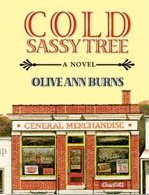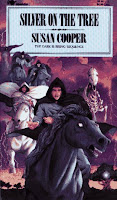I've been wanting to reread this book ever since I saw the trailer for the recent movie because I read this book in grade school, and that trailer didn't look much like the story I vaguely remembered-- I actually thought it looked like a Narnia ripoff. Reading the book, I was surprised to discover that Narnia actually was one of the many inspirations for Leslie Burke's kingdom of Terabithia. The book is wonderful and touching-- but it's really more about Leslie Burke and Jess Aarons and less about their magic kingdom.
Jess is part of a poor family in a rural town outside of Washington. A new family moves into the run-down place nearby, and soon Jess and the new girl Leslie have become fast friends-- in spite of what the kids at school might say or how Jess' older sisters tease him about his "girlfriend." Leslie decides they need a special place all their own, so they pick a spot across a gully-- they have to swing across on an old rope on the tree-- and name their kingdom Terabithia. Leslie loans him her Narnia books so that he will know how to behave as a ruler of a magical kingdom, and she often tells him stories (her parents are both writers, so she's quite well-read, in contrast to Jess and most of his school-mates). Among the books and stories mentioned are Hamlet, Moby Dick, and Lloyd Alexander's Prydain Chronicles (Jess alludes to the adventures of an "assistant pig-keeper"). On Easter Sunday, Leslie comes with the Aaron family to church-- she's never been before, and she thinks it's all a beautiful story. (It seemed a bit strange to me that she never connected it with the Narnia stories.)
Most people who know about this book probably know that it is a sad book-- because near the end, Leslie dies. There have been torrential rains, and the gully that is their way into Terabithia is so flooded that Jess is afraid to swing into it (up past his thighs), although he doesn't want to admit it to Leslie. While Jess is gone for the day, Leslie tries to go to Terabithia and the rope breaks. As most of the book, we get this all filtered through Jess' perspective, and the portrayal of a young person dealing with this kind of news is heartbreaking-- and feels quite believable. At first he's numb, and can't really believe it. He keeps thinking of how he and Leslie will talk about things later, and what everyone is saying about her being dead; at times he wants to blame her, at other times he wants to blame himself. He even thinks horrible thoughts, like that now he'll be the fastest runner in his grade (Leslie beat all the boys at recess the first day of school), or how everyone will treat him special now-- and then the next day realizes how awful it was to think such things.
When I was younger and read this, I was disappointed because there really isn't much fantasy. The title perfectly represents the focus of the book itself-- not on the magical country, but on how you get there. And really, Leslie herself is that bridge-- at least for Jess. When Jess is still reeling from the shock of Leslie's death, he thinks to himself:
She had tricked him. She had made him leave his old self behind and come into her world, and then before he was really at home in it but too late to go back, she had left him stranded there-- like an astronaut wondering about on the moon. Alone.
But, as the book comes to a close, he gets a sense of how being in Leslie's world has transformed him. So, he takes some spare lumber and builds a bridge across the gully into the kingdom, and then he brings his younger sister May Belle (who adores him, and who he has finally come to see as a friend) into the kingdom-- hinting that someday she might bring the younger sister, who she despises as "just a baby" in to Terabithia, too.
Leslie reminded me a bit of Stargirl-- someone who is so special, but different, and most of the kids don't get her or think she's just weird. And someone that people don't get to enjoy for as long as they'd like to.
| Title: | Bridge to Terabithia |
|---|
| Author: | Katherine Paterson |
|---|
| Date published: | 1977 |
|---|
| Genre: | Children's Literature |
|---|
| Number of pages: | 144 |
|---|
| Notes: | repeat reading |
|---|













